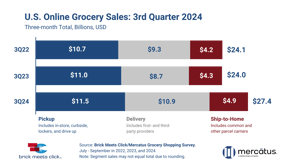A forum for contributed pieces from industry thought leaders, retailers, wholesalers and manufacturers. The views expressed are those of the authors.
Supermarkets must help shoppers understand climate change
Most shoppers do not make the connection between weather conditions and the prices (or availability) of the foods they have on their shopping list.
August 26, 2015
 The reality is that increased food shortages, due to global weather conditions, could well be a real problem for keeping supermarket shelves stocked in the near future. The latest quarterly report from the privately held global investment management firm Grantham Mayo van Otterloo (GMO) notes, as per the UN’s Intergovernmental Panel on Climate Change, that "humanity is risking ‘a breakdown of food systems linked to warming, drought, flooding and precipitation variability and extremes.’” And according to a June report from the Global Sustainability Institute of Anglia Ruskin University, by the year 2040, food prices will be four times higher than they were in 2000.
The reality is that increased food shortages, due to global weather conditions, could well be a real problem for keeping supermarket shelves stocked in the near future. The latest quarterly report from the privately held global investment management firm Grantham Mayo van Otterloo (GMO) notes, as per the UN’s Intergovernmental Panel on Climate Change, that "humanity is risking ‘a breakdown of food systems linked to warming, drought, flooding and precipitation variability and extremes.’” And according to a June report from the Global Sustainability Institute of Anglia Ruskin University, by the year 2040, food prices will be four times higher than they were in 2000.
Our consumer panel surveys continue to underscore the fact that most shoppers do not make the connection between weather conditions and the prices (or availability) of the foods they have on their shopping list. Sure, most have heard that the California drought has affected their produce prices and that bird flu has decimated the laying hen population and that as a result egg prices are up in some cases by a third. However, when we get past the news cycle people forget, and then lay blame on the retailer for higher prices.
With the mass of information and debates surrounding climate change, it can sometimes seem like an intangible and confusing issue for consumers, with many not really understanding the implications or even having an interest in how it may effect their everyday life. With the direct connection to shoppers, our supermarkets can and should do their part to educate the consumer and help them understand why this issue is important and how it will effect their weekly shopping.
Our retail dietitians, butchers, fishmongers, bakers and baristas (to name just a few) all have direct contact with shoppers and are all affected. The butcher explaining how the California drought, for example, has made organic beef production almost impossible due to the organic regulations specifying the number of days a year cows need to pasture affects supply and price. Or the barista explaining how according to the Worldwatch Institute rising temperatures, altered rainfall patterns, and rising pest incidence will increasingly affect future coffee production and pricing.
As confidence in the food supply continues to be challenged with food recalls and company CEOs heading to jail for not following government inspectors’ instructions, we must as an industry do everything we can to educate shoppers — especially about sustainability, which is one of the attributes that the over-focused-on Millennials rank as critical in determining the products and banners they support.
About the Author
You May Also Like






